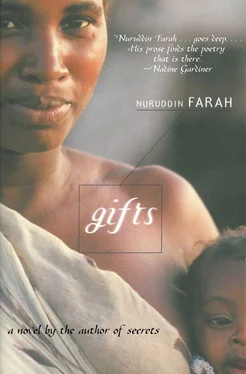Nuruddin Farah - Gifts
Здесь есть возможность читать онлайн «Nuruddin Farah - Gifts» весь текст электронной книги совершенно бесплатно (целиком полную версию без сокращений). В некоторых случаях можно слушать аудио, скачать через торрент в формате fb2 и присутствует краткое содержание. Год выпуска: 2011, Издательство: Arcade Publishing, Жанр: Современная проза, на английском языке. Описание произведения, (предисловие) а так же отзывы посетителей доступны на портале библиотеки ЛибКат.
- Название:Gifts
- Автор:
- Издательство:Arcade Publishing
- Жанр:
- Год:2011
- ISBN:нет данных
- Рейтинг книги:3 / 5. Голосов: 1
-
Избранное:Добавить в избранное
- Отзывы:
-
Ваша оценка:
- 60
- 1
- 2
- 3
- 4
- 5
Gifts: краткое содержание, описание и аннотация
Предлагаем к чтению аннотацию, описание, краткое содержание или предисловие (зависит от того, что написал сам автор книги «Gifts»). Если вы не нашли необходимую информацию о книге — напишите в комментариях, мы постараемся отыскать её.
Gifts — читать онлайн бесплатно полную книгу (весь текст) целиком
Ниже представлен текст книги, разбитый по страницам. Система сохранения места последней прочитанной страницы, позволяет с удобством читать онлайн бесплатно книгу «Gifts», без необходимости каждый раз заново искать на чём Вы остановились. Поставьте закладку, и сможете в любой момент перейти на страницу, на которой закончили чтение.
Интервал:
Закладка:
He offered her a seat, but Waaberi wouldn’t take it. “Would you like to have breakfast with us?” he asked.
“No, thank you,” she said with a touch of nervousness.
Majestically calm, Bosaaso had his hands resting on his hips like a PE instructor watching his trainees rehearse a sequence of exercises, an instructor pleased with the results. “If you’re not sitting down with us and you don’t want to have a cup of tea or a glass of water, is there anything we can do for you?” he said to Waaberi.
Speaking with difficulty, she said, “I’ve come to see you, yes.”
“Why have you come to see me?” And he looked at Duniya, to see what her reaction to the goings-on might be. Hand under chin. None. “I haven’t much time. So speak up please,” he said.
Waaberi almost whispered, “May I speak to you privately?”
“No, you may not.”
“It won’t take more than a minute,” she promised.
“I haven’t a minute to spare. Besides Duniya is no stranger, and there isn’t anything I wouldn’t discuss in front of her.”
Duniya thought Bosaaso might have been a drama student showing to his teacher what he could do.
Waaberi said, “My mother has been unwell.”
“Yes?” said Bosaaso and waited.
“And we’ve just received our electricity, water and other bills, all together.”
“Why bring the bills to me? Or inform me that your mother has been unwell?”
“Because you used to give us a hand in settling some of the bills.”
“Did I only give you a hand or did I settle them all, every cent of your bills?”
Waaberi looked at Duniya for the first time. Then to Bosaaso: “You used to settle them all I am sorry,” and her head bowed, of its own accord. “You’ve always been generous.”
“Do you recall my words when I last called on your mother,” he said, “three days ago, as recently as that?”
She spoke after a pause and with difficulty. “You described yourself as an exploited man, who was being socially blackmailed into giving what he didn’t wish to give any more; you asked us to stop presenting you with our bills.”
“What else did I ask of you? You in particular?”.
She looked too embarrassed to continue. “Go on,” Bosaaso urged her.
“You inquired about how much my jewellery cost, how much the dress and shoes I had on cost, and all my other expensive habits, reminding us that although you worked hard for your money, you couldn’t afford the clothes I wore, and even if you could, you wouldn’t buy them, but would use what you had wisely, care less about external appearances, and not beg.”
“What else did I suggest?” he said.
“That I sell the jewellery to pay the bills.”
“Now whose were they in the first place?”
“Yussur’s.”
“Who was?”
“Your former wife.”
“Did she give them to you, all of the pieces?”
“I borrowed some, and she gave me some.”
“And for how long have I been supporting you and your mother and your expensive tastes after Yussur’s death?”
“One and a half years.”
As though he were counsel for the prosecution rounding up his cross-examination, “Could you remind me when this conversation took place, Waaberi? Do you remember?”
“Three days ago.”
Duniya sensed that she almost added “Sir” to her last response.
Bosaaso sat down. He might have been a jubilant barrister celebrating the end of a successful but difficult case. Anyone might have thought him incapable of such a cruel confrontation.
There was silence. Waaberi looked at Duniya. Was Waaberi appealing to her to intervene? It seemed as if they had been joined by a fourth person. Tension was the fourth person in the kitchen, omnipresent, allowing no one to sit still. This wasn’t a story of equals having a show-down, thought Duniya; not a Duniya confronting the cruelty of a half-brother; or a Yussur having an all-out fight with her mother. This was more like a donor European or American government having a “frank talk” (the all-purpose phrase which would appear in the official communique) with an African country’s representatives, in which the latter were told that they were being immodest in the number of Mercedes and similar extravagances and in the show-pieces they displayed to the rest of the world.
“And you won’t give us anything?” Waaberi said. “Not even this last time?”
“Give your mother my best wishes, that’s all.”
Leaving, Waaberi left behind a tension which strangled Duniya and Bosaaso, preventing them from speaking, even after the outside gate had been shut.
Then, after a long silence, he said, “It’s getting late.”
Absent-mindedly, Duniya asked, “Late for what?”
“I must go and collect the keys from the cleaning women, call at my cousin’s commune and arrange that Axmad joins us in his taxi this afternoon to go to the airport.” He paused. He was sure he had forgotten something.
She didn’t say anything.
“Are you coming or staying?”
She thought that he had his tension to keep him company; so she said, “I’ll wait for you here, do the washing-up and all that. But could you call at my place on your way back? Just to find out how things are?”
Kissing her lightly, he said, “Ciao.”
“Ciao!”
Duniya turned a question over and over in her mind, faster and faster, until the words comprising the question ran into each other. Bosaaso had been gone almost half an hour, by which time she had done the dishes. Then the bell in the kitchen rang.
She went to open the door. She was surprised to be greeted by Hibo and Kaahin.
Duniya invited them to come in and walked away, hoping one of them would push the gate shut and then both would follow her. When she didn’t hear their footsteps, Duniya turned. Curiously, they were talking in whispers, arguing about something. Now she might not have invited Kaahin into her house, but this wasn’t hers, and from what she knew of Kaahin’s and Bosaaso’s relationship, he was welcome in his friend’s house. But now she hesitated and was unable to decide what to do. Were Kaahin and Hibo having a very quiet affair and had they come here, assuming to find only Bosaaso who in any case had known of their liaison? She became irritable. “What’s all this? Why won’t you come in?” she said to them.
Hibo’s eyes moved like a scatter of frightened ants. But Kaahin did not display any nervousness, no deference.
Looking from one to the other, she said, “If you people aren’t coming in, I am going inside to make myself a cup of something and sit in the living-room.”
Unsmiling, Hibo said to Kaahin, “I’ll go in with Duniya, but you sit and wait in the car.”
Duniya knew it wasn’t her business to interfere, but said, maybe out of a desire to avoid misunderstanding, “Come inside, Kaahin.”
He looked like a man who had been dispossessed of all he owned. Duniya thought that Kaahin shared a meagre resemblance with Mataan, in that he too appeared to bloom best when treated like a son. She wondered if this had been the way Zawadi had always treated him, like a son, although he wasn’t her junior in years. And his mouth opened just like Mataan’s and wouldn’t shut; his beady eyes had a glint in them, reflective as silver, when the sun shone on them. “I don’t mind if I wait outside in the car, really,” he said.
“Come, let’s all go inside,” Duniya said to Hibo.
“But I’ve come to talk to you.”
“Let’s go inside, all three of us,” insisted Duniya.
She walked away and was relieved to hear the outside gate bang shut and two sets of footsteps following her. If nothing had been going on between them, what were they saying to each other all the time?
Читать дальшеИнтервал:
Закладка:
Похожие книги на «Gifts»
Представляем Вашему вниманию похожие книги на «Gifts» списком для выбора. Мы отобрали схожую по названию и смыслу литературу в надежде предоставить читателям больше вариантов отыскать новые, интересные, ещё непрочитанные произведения.
Обсуждение, отзывы о книге «Gifts» и просто собственные мнения читателей. Оставьте ваши комментарии, напишите, что Вы думаете о произведении, его смысле или главных героях. Укажите что конкретно понравилось, а что нет, и почему Вы так считаете.











